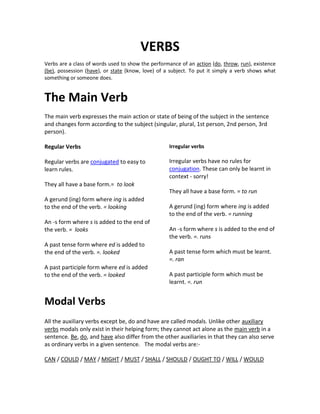
Learn Key Verb Types and Uses
- 1. VERBS<br />Verbs are a class of words used to show the performance of an action (do, throw, run), existence (be), possession (have), or state (know, love) of a subject. To put it simply a verb shows what something or someone does.<br />The Main Verb<br />The main verb expresses the main action or state of being of the subject in the sentence and changes form according to the subject (singular, plural, 1st person, 2nd person, 3rd person).<br />Regular Verbs <br />Regular verbs are conjugated to easy to learn rules. <br />They all have a base form.= to look <br />A gerund (ing) form where ing is added to the end of the verb. = looking <br />An -s form where s is added to the end of the verb. = looks <br />A past tense form where ed is added to the end of the verb. =. looked <br />A past participle form where ed is added to the end of the verb. = looked <br />Irregular verbs <br />Irregular verbs have no rules for conjugation. These can only be learnt in context - sorry! <br />They all have a base form. = to run <br />A gerund (ing) form where ing is added to the end of the verb. = running <br />An -s form where s is added to the end of the verb. =. runs <br />A past tense form which must be learnt. =. ran <br />A past participle form which must be learnt. =. run <br />Modal Verbs<br />All the auxiliary verbs except be, do and have are called modals. Unlike other auxiliary verbs modals only exist in their helping form; they cannot act alone as the main verb in a sentence. Be, do, and have also differ from the other auxiliaries in that they can also serve as ordinary verbs in a given sentence. The modal verbs are:- <br />CAN / COULD / MAY / MIGHT / MUST / SHALL / SHOULD / OUGHT TO / WILL / WOULD <br />Modal Example Uses CanThey can control their own budgets. We can’t fix it. Can I smoke here? Can you help me? Ability / Possibility Inability / Impossibility Asking for permission Request CouldCould I borrow your dictionary? Could you say it again more slowly? We could try to fix it ourselves. I think we could have another Gulf War. He gave up his old job so he could work for us. Asking for permission. Request Suggestion Future possibility Ability in the past MayMay I have another cup of coffee? China may become a major economic power. Asking for permission Future possibility MightWe'd better phone tomorrow, they might be eating their dinner now. They might give us a 10% discount.Present possibilityFuture possibilityMustWe must say good-bye now. They mustn’t disrupt the work more than necessary. Necessity / Obligation Prohibition Ought toWe ought to employ a professional writer.Saying what’s right or correctShall (More common in the UK than the US) Shall I help you with your luggage? Shall we say 2.30 then? Shall I do that or will you? Offer Suggestion Asking what to do ShouldWe should sort out this problem at once. I think we should check everything again. Profits should increase next year. Saying what’s right or correct Recommending action Uncertain prediction WillI can’t see any taxis so I’ll walk. I'll do that for you if you like. I’ll get back to you first thing on Monday. Profits will increase next year. Instant decisions Offer Promise Certain prediction WouldWould you mind if I brought a colleague with me? Would you pass the salt please? Would you mind waiting a moment? quot; Would three o`clock suit you?quot; - quot; That’d be fine.quot; Would you like to play golf this Friday? quot; Would you prefer tea or coffee?quot; - quot; I’d like tea please.quot; Asking for permission Request Request Making arrangements Invitation Preferences <br />